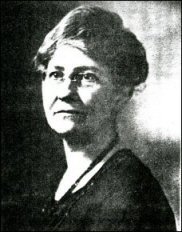|
 |
|
 |
Wednesday, May 26, 1948
Pioneer life was especially hard for the women, although I doubt they realized that fact as fully as we, looking back from the comparative ease of the 20th century. Here in their little bare, isolated cabins they bore large families—sometimes as many as ten and twelve children. Ignorant even of the simple laws of hygiene, with scattered medical men, no trained nurses to speak of, and with few facilities present day young mothers have, it is no wonder that the death rate from child-birth was terrific. And not only the mothers, but the babies were lost. The horror of infection felt to-day was yet unknown. Superstition rather than trained intelligence ruled conspicuously among the midwives who were often simply a kindly neighbor as ignorant as the suffering mother.
Yet they survived to care for the babe and a large family to weave their linen and woolen cloth, to cook with cumbrous iron utensils, to make their soft soap, to aid a neighbor in her time of pain, to make her rugs and her garments, to teach and prepare their children, who, in their turn took upon themselves the greivous and difficult way of life which was the only kind they knew.
Look upon their faces as pictured in the books which have come down to us. Faces patient, strong, sweet, uncomplaining, and proud from a sense of duty well performed, and in your mind place upon their brow the crown of glory they deserve. For this Northland is what it is to-day because they faltered not nor wavered all through those difficult years of clearing the land, building their homes and raising their children to "Fear God and Keep His Commandments."
Among the gala days of your great grandfather was a "raisin'." This was pre-eminently for the men, and not entirely unmixed with labor. Indeed, it seems as though all their pleasures were mixed with work. At the "raisin'", say of a barn 100 years ago, the framework of the top story was perhaps at least started, maybe finished, the lower part of the building already upright. The men in the locality gathered to place the roof rafters on the lower part. This was done by the united strength of all present, lifting the built roof onto the lower part of the barn. Timbers had to be evenly placed and strongly secured, so a "raisin'" was really quite a job. It has been said that the flowing bowl was not missing the flowing freely at that.
Our forebears had not all signed a pledge and indulged at such times so as to increase their endurance. Whiskey figured quite frequently in pioneer celebrations, I have been told. Some who have apologized for their indulgence say that the intoxicants of that day were pure and devoid of the poisonous qualities of some strong drink of to-day. Of that I cannot take my oath. But the Parish whiskey made here in the old brewery was noted for its fine flavor and the innocent effect of it. I do know that very poisonous stuff was made even in small villages during the prohibition era and some men died from its effects. In my estimation whiskey and drunkeness are in the long run equally injurious whether made in 1800 or 1900.
At the "raisins," feats of strength were indulged in by the men. Wrestling was a favorite sport, and the best man at that was something of a local hero. At day's end the women laid a festive board for those who had so valiantly helped in the construction of a new barn and perhaps a little dancing closed the old-time labor of husky and virile men who thought little of using their great strength in aid of a neighbor. And if great-grandfather was overcome in other than weariness, who are you to cast the first stone—in 1948?
Later when all preparations had been made, the whole community gathered for a barn dance and the old dances were enjoyed, square dances, the waltz and schottische dances. And some games were played, blind man's bluff, chase the squirrel and others. In their relaxation they worked as hard as when performing their labors. They had frequent dances, the folk dances predominating.
A "fiddle" was the usual medium of the music. The stimulation of getting together, of ordered motion and the music was a real rest from the hard duties of their days.
"Going visitin'" was another method of relaxation they had. This especially appealed to the women for a day's change. Into the ox-cart or sleigh they could bundle the baby and their knitting and be off for a few hour's forgetfulness of hard work and indulge in the gossip rampant in the settlement, for no matter how isolated these humans may be, their interests were alike, keenly regarding each other. There were exciting recitals of one another's accomplishments, their successes in the new quilts, counterpanes, the approaching marriage of a dear daughter, and the exquisite embroidery they found time to do.
Often both father and mother went visitin' to relatives or friends, all glad to see each other. Then the men-folks had their talk-fests on politics, religion, the roads, the crops and other absorbing matters. Much feasting on the plentiful meats, vegetables, and fruits they all raised accompanied a visitin'.
There was much to do in those old days. Everything was so intriguingly new. There was so much to look forward to that conversation seldom lagged, and the contact with someone not in their everyday family refreshed them all.
To think of how differently their train of thought was from ours is to go back into a new world. It was no great matter to them if Chinese babies starved. Kings and queens, of whom there were many then, were like the fairy stories their mothers had told them. Their lack of contact with the great affairs beyond their small horizon is unthinkable to us of to-day.
|